Business Ethics and Ethical Leadership in the Modern World
VerifiedAdded on 2023/05/29
|10
|2793
|248
Essay
AI Summary
This essay examines the critical need for ethical leadership in the contemporary business environment. It explores the impact of leaders' values and ethics on organizational culture, decision-making processes, and stakeholder relationships. The essay highlights the importance of ethical behavior in maintaining customer and stakeholder trust, emphasizing the long-term benefits of honesty and fairness. It also discusses the consequences of unethical practices, including legal issues and reputational damage. The essay emphasizes the necessity of ethical leaders to make principle and fair choices, foster a transparent work environment, and promote open communication. It concludes by underscoring the significant influence of ethical leadership on employee behavior, job satisfaction, and organizational commitment, advocating for ethical practices to ensure the long-term success and positive public image of businesses.
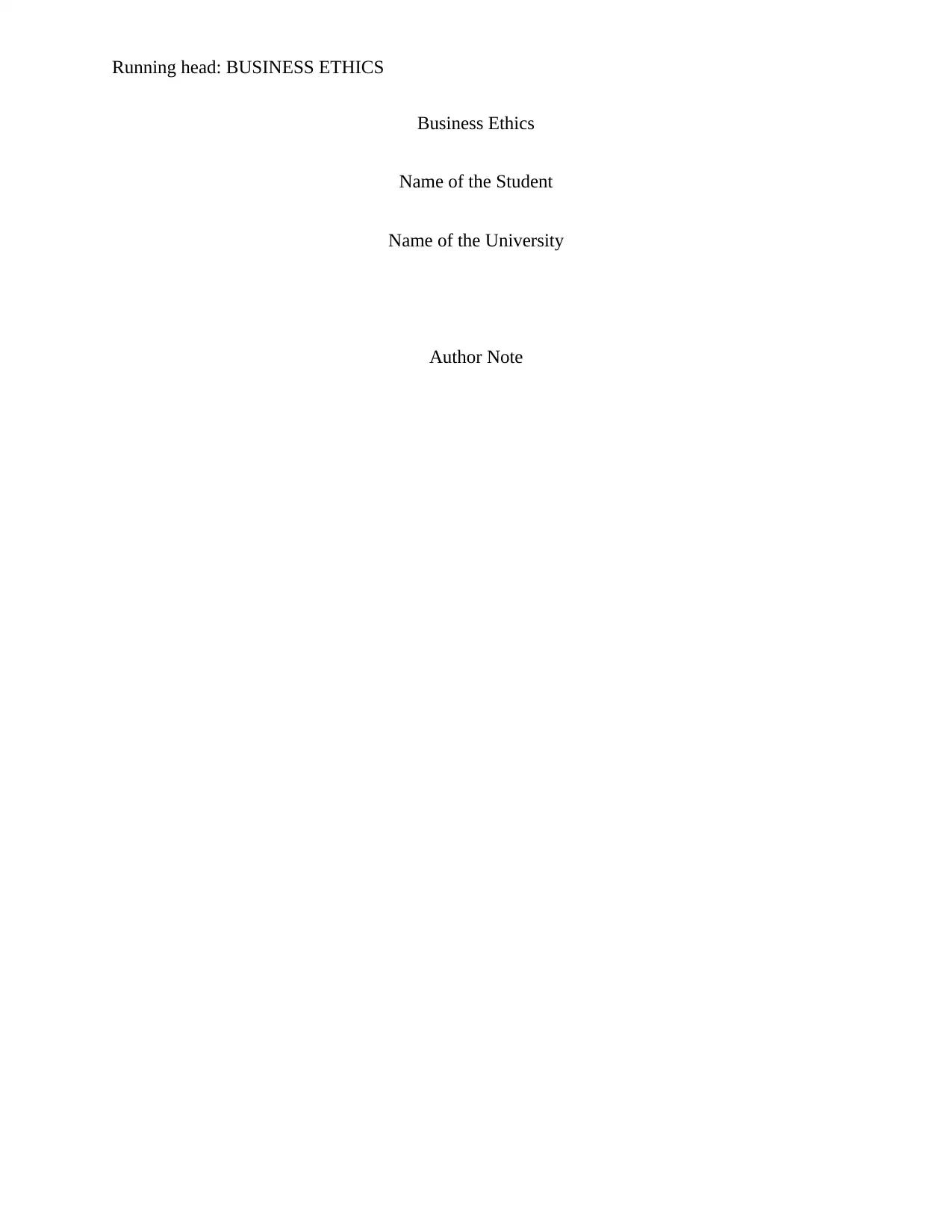
Running head: BUSINESS ETHICS
Business Ethics
Name of the Student
Name of the University
Author Note
Business Ethics
Name of the Student
Name of the University
Author Note
Paraphrase This Document
Need a fresh take? Get an instant paraphrase of this document with our AI Paraphraser
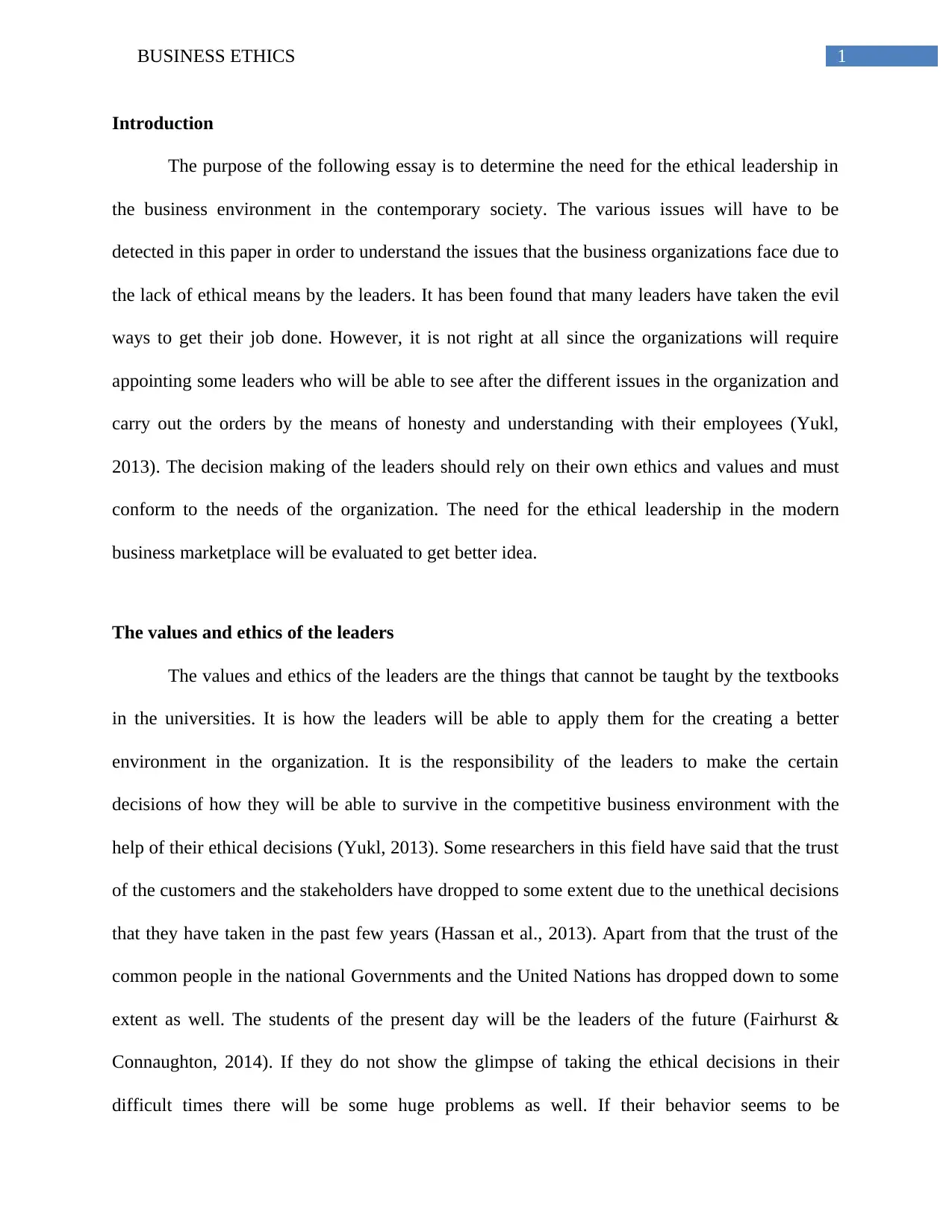
1BUSINESS ETHICS
Introduction
The purpose of the following essay is to determine the need for the ethical leadership in
the business environment in the contemporary society. The various issues will have to be
detected in this paper in order to understand the issues that the business organizations face due to
the lack of ethical means by the leaders. It has been found that many leaders have taken the evil
ways to get their job done. However, it is not right at all since the organizations will require
appointing some leaders who will be able to see after the different issues in the organization and
carry out the orders by the means of honesty and understanding with their employees (Yukl,
2013). The decision making of the leaders should rely on their own ethics and values and must
conform to the needs of the organization. The need for the ethical leadership in the modern
business marketplace will be evaluated to get better idea.
The values and ethics of the leaders
The values and ethics of the leaders are the things that cannot be taught by the textbooks
in the universities. It is how the leaders will be able to apply them for the creating a better
environment in the organization. It is the responsibility of the leaders to make the certain
decisions of how they will be able to survive in the competitive business environment with the
help of their ethical decisions (Yukl, 2013). Some researchers in this field have said that the trust
of the customers and the stakeholders have dropped to some extent due to the unethical decisions
that they have taken in the past few years (Hassan et al., 2013). Apart from that the trust of the
common people in the national Governments and the United Nations has dropped down to some
extent as well. The students of the present day will be the leaders of the future (Fairhurst &
Connaughton, 2014). If they do not show the glimpse of taking the ethical decisions in their
difficult times there will be some huge problems as well. If their behavior seems to be
Introduction
The purpose of the following essay is to determine the need for the ethical leadership in
the business environment in the contemporary society. The various issues will have to be
detected in this paper in order to understand the issues that the business organizations face due to
the lack of ethical means by the leaders. It has been found that many leaders have taken the evil
ways to get their job done. However, it is not right at all since the organizations will require
appointing some leaders who will be able to see after the different issues in the organization and
carry out the orders by the means of honesty and understanding with their employees (Yukl,
2013). The decision making of the leaders should rely on their own ethics and values and must
conform to the needs of the organization. The need for the ethical leadership in the modern
business marketplace will be evaluated to get better idea.
The values and ethics of the leaders
The values and ethics of the leaders are the things that cannot be taught by the textbooks
in the universities. It is how the leaders will be able to apply them for the creating a better
environment in the organization. It is the responsibility of the leaders to make the certain
decisions of how they will be able to survive in the competitive business environment with the
help of their ethical decisions (Yukl, 2013). Some researchers in this field have said that the trust
of the customers and the stakeholders have dropped to some extent due to the unethical decisions
that they have taken in the past few years (Hassan et al., 2013). Apart from that the trust of the
common people in the national Governments and the United Nations has dropped down to some
extent as well. The students of the present day will be the leaders of the future (Fairhurst &
Connaughton, 2014). If they do not show the glimpse of taking the ethical decisions in their
difficult times there will be some huge problems as well. If their behavior seems to be
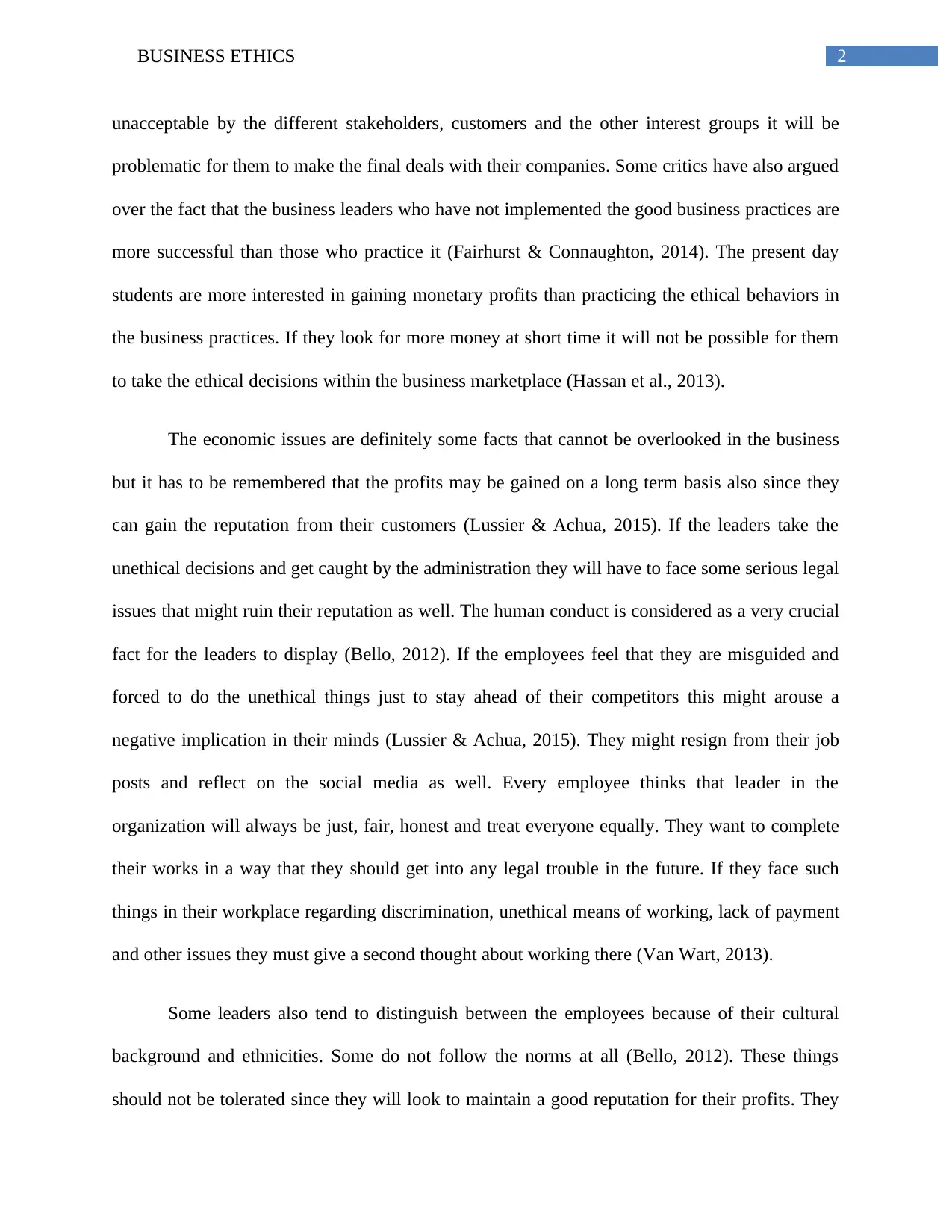
2BUSINESS ETHICS
unacceptable by the different stakeholders, customers and the other interest groups it will be
problematic for them to make the final deals with their companies. Some critics have also argued
over the fact that the business leaders who have not implemented the good business practices are
more successful than those who practice it (Fairhurst & Connaughton, 2014). The present day
students are more interested in gaining monetary profits than practicing the ethical behaviors in
the business practices. If they look for more money at short time it will not be possible for them
to take the ethical decisions within the business marketplace (Hassan et al., 2013).
The economic issues are definitely some facts that cannot be overlooked in the business
but it has to be remembered that the profits may be gained on a long term basis also since they
can gain the reputation from their customers (Lussier & Achua, 2015). If the leaders take the
unethical decisions and get caught by the administration they will have to face some serious legal
issues that might ruin their reputation as well. The human conduct is considered as a very crucial
fact for the leaders to display (Bello, 2012). If the employees feel that they are misguided and
forced to do the unethical things just to stay ahead of their competitors this might arouse a
negative implication in their minds (Lussier & Achua, 2015). They might resign from their job
posts and reflect on the social media as well. Every employee thinks that leader in the
organization will always be just, fair, honest and treat everyone equally. They want to complete
their works in a way that they should get into any legal trouble in the future. If they face such
things in their workplace regarding discrimination, unethical means of working, lack of payment
and other issues they must give a second thought about working there (Van Wart, 2013).
Some leaders also tend to distinguish between the employees because of their cultural
background and ethnicities. Some do not follow the norms at all (Bello, 2012). These things
should not be tolerated since they will look to maintain a good reputation for their profits. They
unacceptable by the different stakeholders, customers and the other interest groups it will be
problematic for them to make the final deals with their companies. Some critics have also argued
over the fact that the business leaders who have not implemented the good business practices are
more successful than those who practice it (Fairhurst & Connaughton, 2014). The present day
students are more interested in gaining monetary profits than practicing the ethical behaviors in
the business practices. If they look for more money at short time it will not be possible for them
to take the ethical decisions within the business marketplace (Hassan et al., 2013).
The economic issues are definitely some facts that cannot be overlooked in the business
but it has to be remembered that the profits may be gained on a long term basis also since they
can gain the reputation from their customers (Lussier & Achua, 2015). If the leaders take the
unethical decisions and get caught by the administration they will have to face some serious legal
issues that might ruin their reputation as well. The human conduct is considered as a very crucial
fact for the leaders to display (Bello, 2012). If the employees feel that they are misguided and
forced to do the unethical things just to stay ahead of their competitors this might arouse a
negative implication in their minds (Lussier & Achua, 2015). They might resign from their job
posts and reflect on the social media as well. Every employee thinks that leader in the
organization will always be just, fair, honest and treat everyone equally. They want to complete
their works in a way that they should get into any legal trouble in the future. If they face such
things in their workplace regarding discrimination, unethical means of working, lack of payment
and other issues they must give a second thought about working there (Van Wart, 2013).
Some leaders also tend to distinguish between the employees because of their cultural
background and ethnicities. Some do not follow the norms at all (Bello, 2012). These things
should not be tolerated since they will look to maintain a good reputation for their profits. They
⊘ This is a preview!⊘
Do you want full access?
Subscribe today to unlock all pages.

Trusted by 1+ million students worldwide
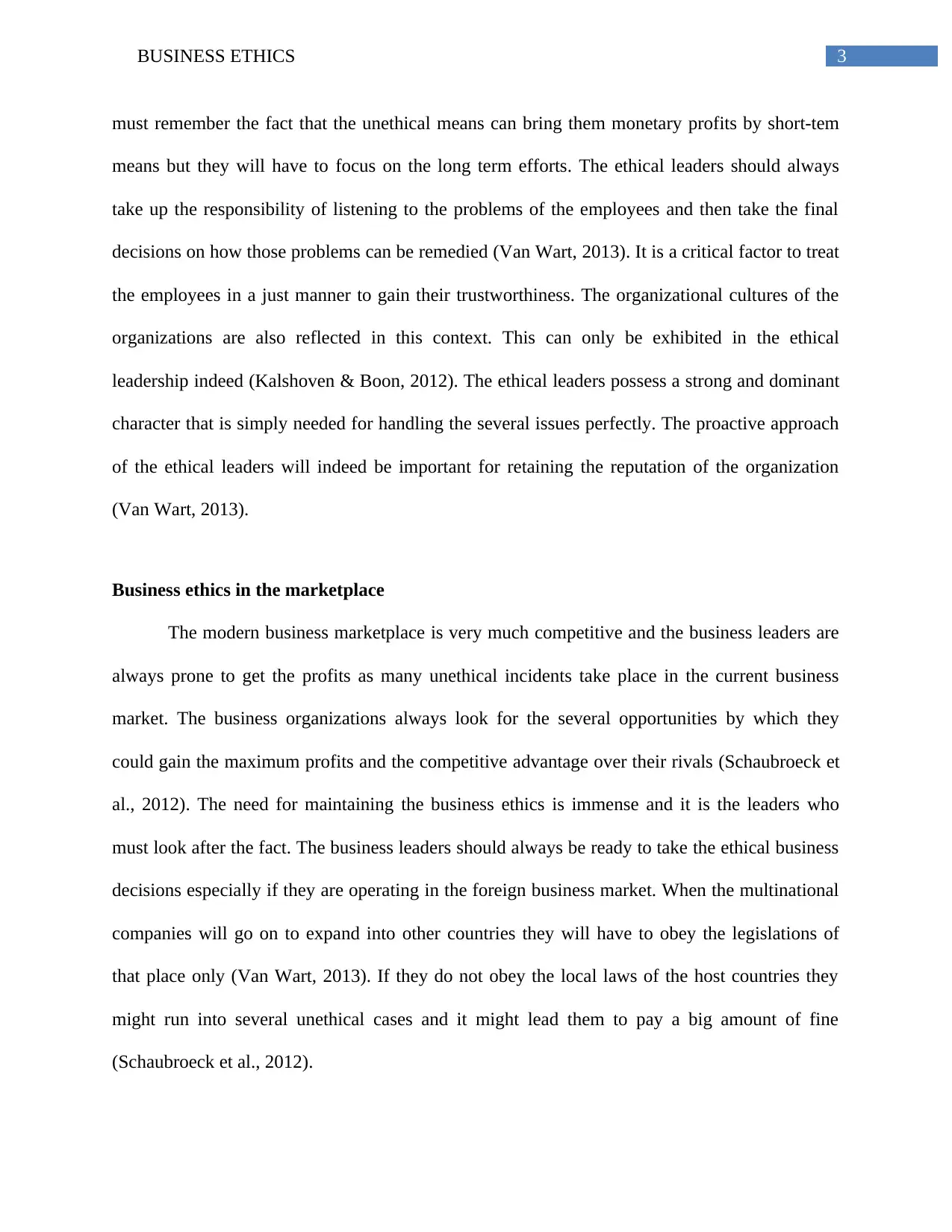
3BUSINESS ETHICS
must remember the fact that the unethical means can bring them monetary profits by short-tem
means but they will have to focus on the long term efforts. The ethical leaders should always
take up the responsibility of listening to the problems of the employees and then take the final
decisions on how those problems can be remedied (Van Wart, 2013). It is a critical factor to treat
the employees in a just manner to gain their trustworthiness. The organizational cultures of the
organizations are also reflected in this context. This can only be exhibited in the ethical
leadership indeed (Kalshoven & Boon, 2012). The ethical leaders possess a strong and dominant
character that is simply needed for handling the several issues perfectly. The proactive approach
of the ethical leaders will indeed be important for retaining the reputation of the organization
(Van Wart, 2013).
Business ethics in the marketplace
The modern business marketplace is very much competitive and the business leaders are
always prone to get the profits as many unethical incidents take place in the current business
market. The business organizations always look for the several opportunities by which they
could gain the maximum profits and the competitive advantage over their rivals (Schaubroeck et
al., 2012). The need for maintaining the business ethics is immense and it is the leaders who
must look after the fact. The business leaders should always be ready to take the ethical business
decisions especially if they are operating in the foreign business market. When the multinational
companies will go on to expand into other countries they will have to obey the legislations of
that place only (Van Wart, 2013). If they do not obey the local laws of the host countries they
might run into several unethical cases and it might lead them to pay a big amount of fine
(Schaubroeck et al., 2012).
must remember the fact that the unethical means can bring them monetary profits by short-tem
means but they will have to focus on the long term efforts. The ethical leaders should always
take up the responsibility of listening to the problems of the employees and then take the final
decisions on how those problems can be remedied (Van Wart, 2013). It is a critical factor to treat
the employees in a just manner to gain their trustworthiness. The organizational cultures of the
organizations are also reflected in this context. This can only be exhibited in the ethical
leadership indeed (Kalshoven & Boon, 2012). The ethical leaders possess a strong and dominant
character that is simply needed for handling the several issues perfectly. The proactive approach
of the ethical leaders will indeed be important for retaining the reputation of the organization
(Van Wart, 2013).
Business ethics in the marketplace
The modern business marketplace is very much competitive and the business leaders are
always prone to get the profits as many unethical incidents take place in the current business
market. The business organizations always look for the several opportunities by which they
could gain the maximum profits and the competitive advantage over their rivals (Schaubroeck et
al., 2012). The need for maintaining the business ethics is immense and it is the leaders who
must look after the fact. The business leaders should always be ready to take the ethical business
decisions especially if they are operating in the foreign business market. When the multinational
companies will go on to expand into other countries they will have to obey the legislations of
that place only (Van Wart, 2013). If they do not obey the local laws of the host countries they
might run into several unethical cases and it might lead them to pay a big amount of fine
(Schaubroeck et al., 2012).
Paraphrase This Document
Need a fresh take? Get an instant paraphrase of this document with our AI Paraphraser
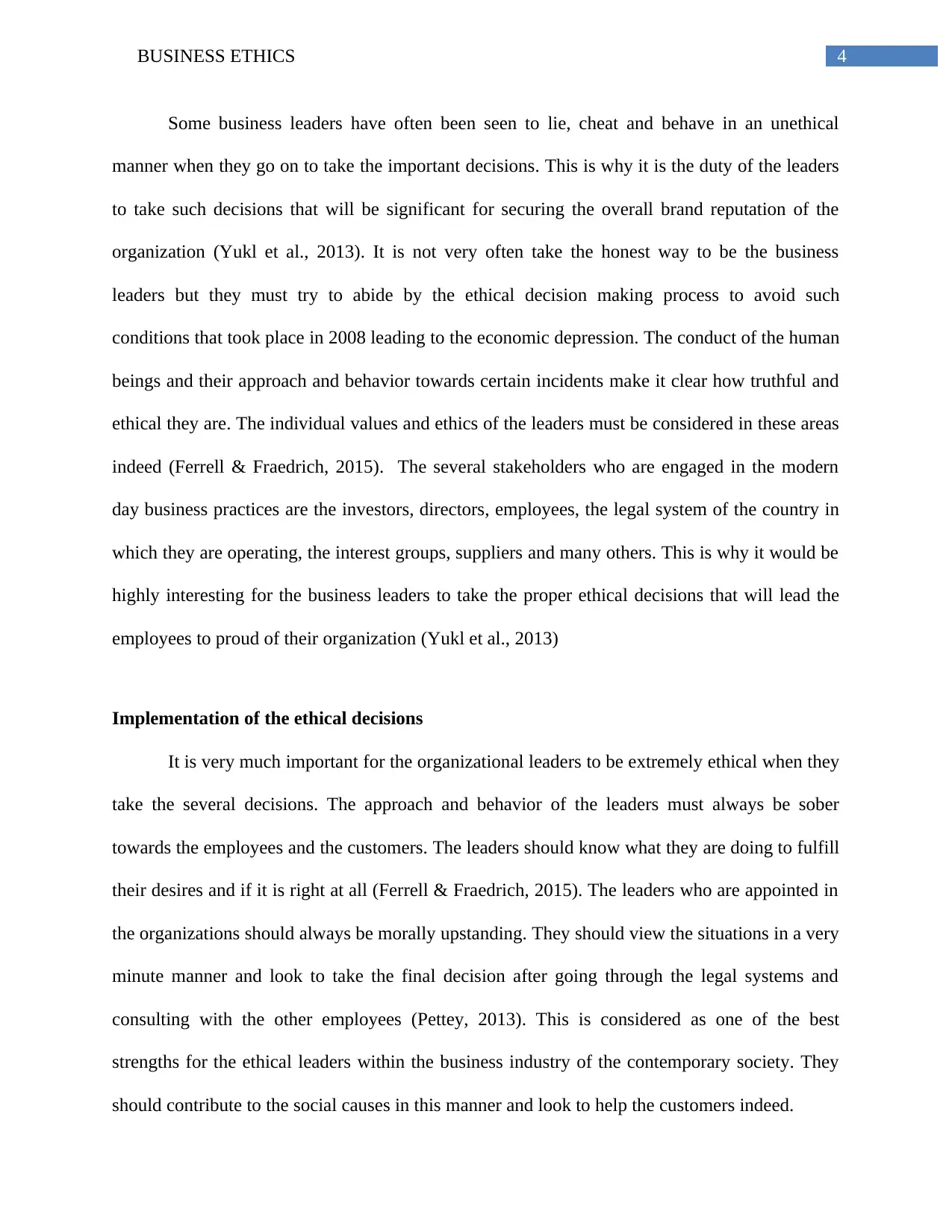
4BUSINESS ETHICS
Some business leaders have often been seen to lie, cheat and behave in an unethical
manner when they go on to take the important decisions. This is why it is the duty of the leaders
to take such decisions that will be significant for securing the overall brand reputation of the
organization (Yukl et al., 2013). It is not very often take the honest way to be the business
leaders but they must try to abide by the ethical decision making process to avoid such
conditions that took place in 2008 leading to the economic depression. The conduct of the human
beings and their approach and behavior towards certain incidents make it clear how truthful and
ethical they are. The individual values and ethics of the leaders must be considered in these areas
indeed (Ferrell & Fraedrich, 2015). The several stakeholders who are engaged in the modern
day business practices are the investors, directors, employees, the legal system of the country in
which they are operating, the interest groups, suppliers and many others. This is why it would be
highly interesting for the business leaders to take the proper ethical decisions that will lead the
employees to proud of their organization (Yukl et al., 2013)
Implementation of the ethical decisions
It is very much important for the organizational leaders to be extremely ethical when they
take the several decisions. The approach and behavior of the leaders must always be sober
towards the employees and the customers. The leaders should know what they are doing to fulfill
their desires and if it is right at all (Ferrell & Fraedrich, 2015). The leaders who are appointed in
the organizations should always be morally upstanding. They should view the situations in a very
minute manner and look to take the final decision after going through the legal systems and
consulting with the other employees (Pettey, 2013). This is considered as one of the best
strengths for the ethical leaders within the business industry of the contemporary society. They
should contribute to the social causes in this manner and look to help the customers indeed.
Some business leaders have often been seen to lie, cheat and behave in an unethical
manner when they go on to take the important decisions. This is why it is the duty of the leaders
to take such decisions that will be significant for securing the overall brand reputation of the
organization (Yukl et al., 2013). It is not very often take the honest way to be the business
leaders but they must try to abide by the ethical decision making process to avoid such
conditions that took place in 2008 leading to the economic depression. The conduct of the human
beings and their approach and behavior towards certain incidents make it clear how truthful and
ethical they are. The individual values and ethics of the leaders must be considered in these areas
indeed (Ferrell & Fraedrich, 2015). The several stakeholders who are engaged in the modern
day business practices are the investors, directors, employees, the legal system of the country in
which they are operating, the interest groups, suppliers and many others. This is why it would be
highly interesting for the business leaders to take the proper ethical decisions that will lead the
employees to proud of their organization (Yukl et al., 2013)
Implementation of the ethical decisions
It is very much important for the organizational leaders to be extremely ethical when they
take the several decisions. The approach and behavior of the leaders must always be sober
towards the employees and the customers. The leaders should know what they are doing to fulfill
their desires and if it is right at all (Ferrell & Fraedrich, 2015). The leaders who are appointed in
the organizations should always be morally upstanding. They should view the situations in a very
minute manner and look to take the final decision after going through the legal systems and
consulting with the other employees (Pettey, 2013). This is considered as one of the best
strengths for the ethical leaders within the business industry of the contemporary society. They
should contribute to the social causes in this manner and look to help the customers indeed.
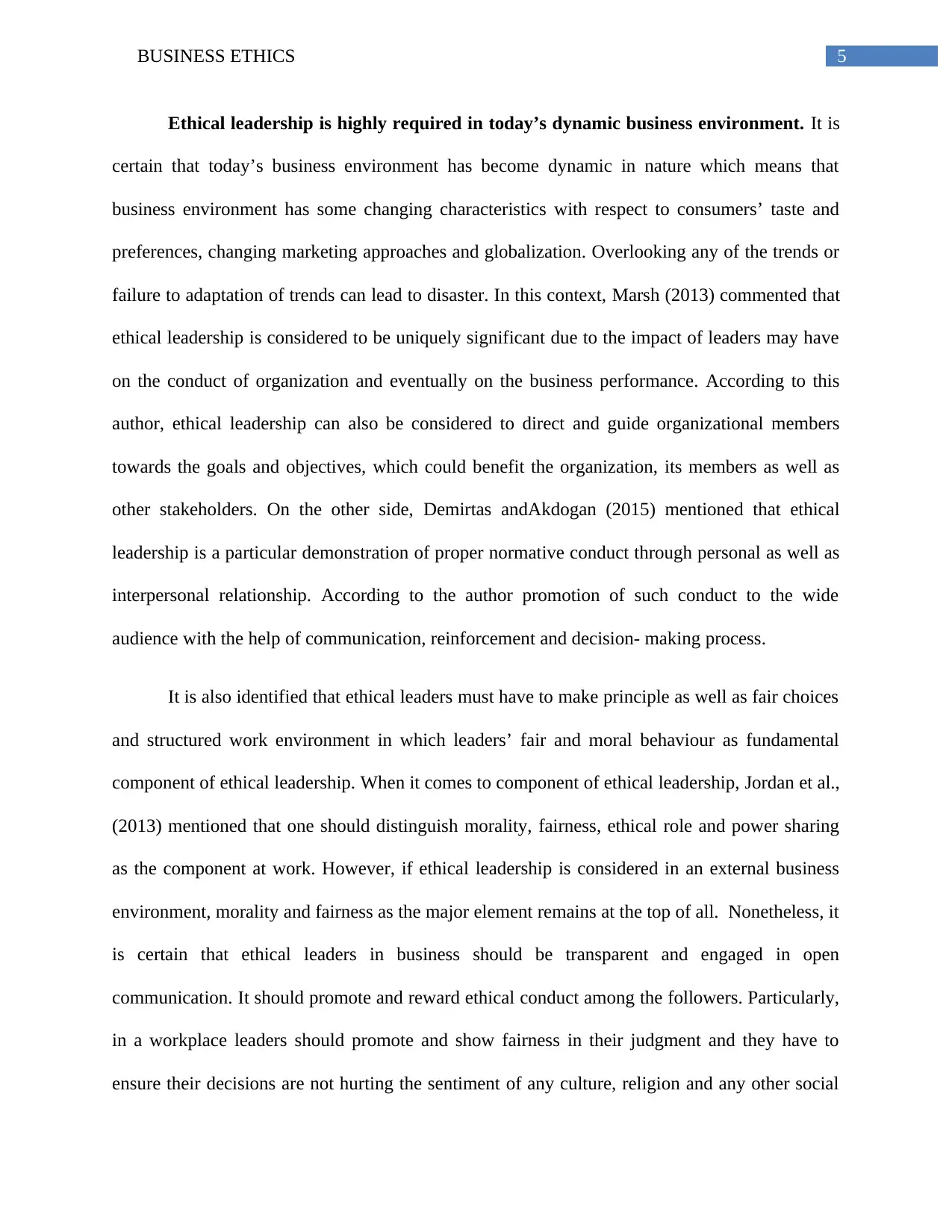
5BUSINESS ETHICS
Ethical leadership is highly required in today’s dynamic business environment. It is
certain that today’s business environment has become dynamic in nature which means that
business environment has some changing characteristics with respect to consumers’ taste and
preferences, changing marketing approaches and globalization. Overlooking any of the trends or
failure to adaptation of trends can lead to disaster. In this context, Marsh (2013) commented that
ethical leadership is considered to be uniquely significant due to the impact of leaders may have
on the conduct of organization and eventually on the business performance. According to this
author, ethical leadership can also be considered to direct and guide organizational members
towards the goals and objectives, which could benefit the organization, its members as well as
other stakeholders. On the other side, Demirtas andAkdogan (2015) mentioned that ethical
leadership is a particular demonstration of proper normative conduct through personal as well as
interpersonal relationship. According to the author promotion of such conduct to the wide
audience with the help of communication, reinforcement and decision- making process.
It is also identified that ethical leaders must have to make principle as well as fair choices
and structured work environment in which leaders’ fair and moral behaviour as fundamental
component of ethical leadership. When it comes to component of ethical leadership, Jordan et al.,
(2013) mentioned that one should distinguish morality, fairness, ethical role and power sharing
as the component at work. However, if ethical leadership is considered in an external business
environment, morality and fairness as the major element remains at the top of all. Nonetheless, it
is certain that ethical leaders in business should be transparent and engaged in open
communication. It should promote and reward ethical conduct among the followers. Particularly,
in a workplace leaders should promote and show fairness in their judgment and they have to
ensure their decisions are not hurting the sentiment of any culture, religion and any other social
Ethical leadership is highly required in today’s dynamic business environment. It is
certain that today’s business environment has become dynamic in nature which means that
business environment has some changing characteristics with respect to consumers’ taste and
preferences, changing marketing approaches and globalization. Overlooking any of the trends or
failure to adaptation of trends can lead to disaster. In this context, Marsh (2013) commented that
ethical leadership is considered to be uniquely significant due to the impact of leaders may have
on the conduct of organization and eventually on the business performance. According to this
author, ethical leadership can also be considered to direct and guide organizational members
towards the goals and objectives, which could benefit the organization, its members as well as
other stakeholders. On the other side, Demirtas andAkdogan (2015) mentioned that ethical
leadership is a particular demonstration of proper normative conduct through personal as well as
interpersonal relationship. According to the author promotion of such conduct to the wide
audience with the help of communication, reinforcement and decision- making process.
It is also identified that ethical leaders must have to make principle as well as fair choices
and structured work environment in which leaders’ fair and moral behaviour as fundamental
component of ethical leadership. When it comes to component of ethical leadership, Jordan et al.,
(2013) mentioned that one should distinguish morality, fairness, ethical role and power sharing
as the component at work. However, if ethical leadership is considered in an external business
environment, morality and fairness as the major element remains at the top of all. Nonetheless, it
is certain that ethical leaders in business should be transparent and engaged in open
communication. It should promote and reward ethical conduct among the followers. Particularly,
in a workplace leaders should promote and show fairness in their judgment and they have to
ensure their decisions are not hurting the sentiment of any culture, religion and any other social
⊘ This is a preview!⊘
Do you want full access?
Subscribe today to unlock all pages.

Trusted by 1+ million students worldwide
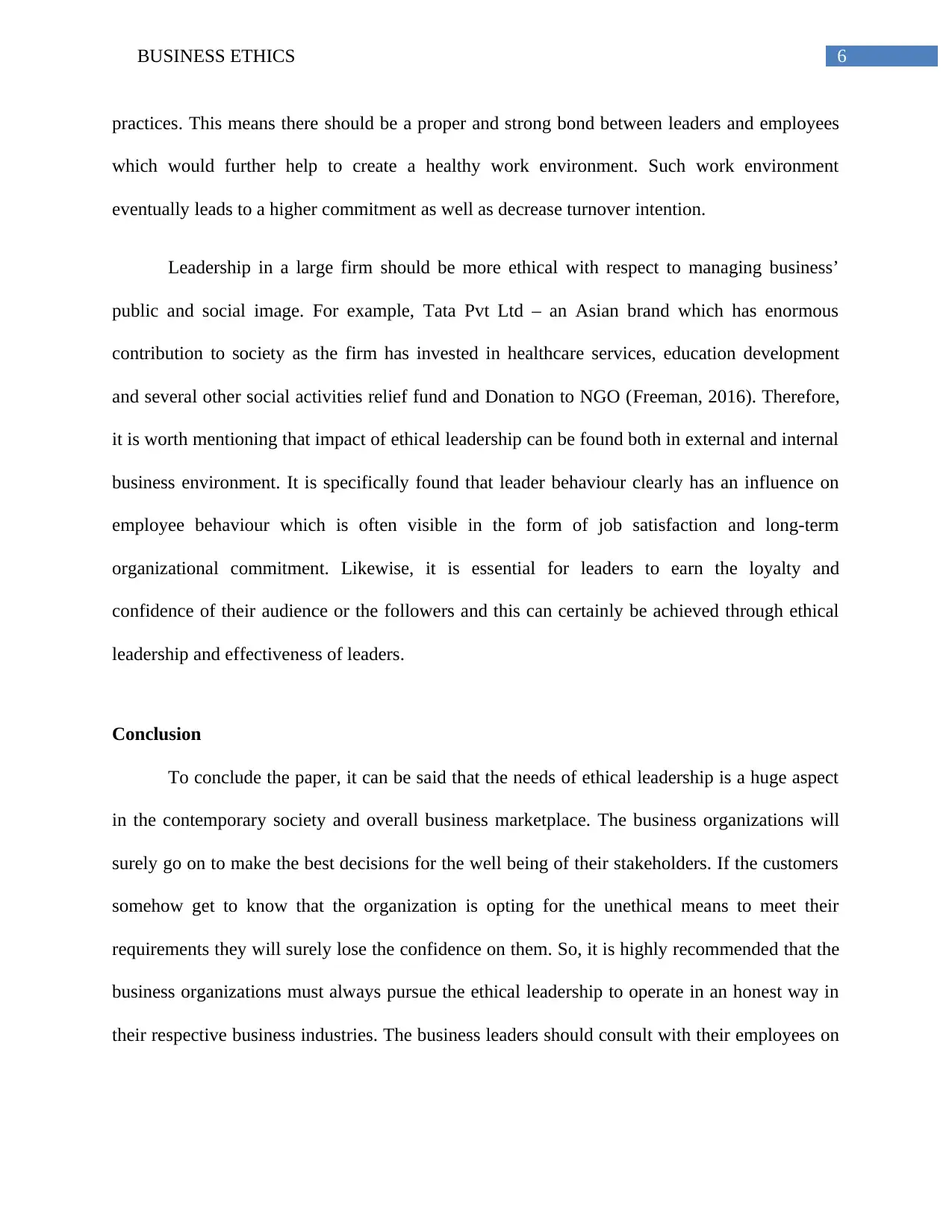
6BUSINESS ETHICS
practices. This means there should be a proper and strong bond between leaders and employees
which would further help to create a healthy work environment. Such work environment
eventually leads to a higher commitment as well as decrease turnover intention.
Leadership in a large firm should be more ethical with respect to managing business’
public and social image. For example, Tata Pvt Ltd – an Asian brand which has enormous
contribution to society as the firm has invested in healthcare services, education development
and several other social activities relief fund and Donation to NGO (Freeman, 2016). Therefore,
it is worth mentioning that impact of ethical leadership can be found both in external and internal
business environment. It is specifically found that leader behaviour clearly has an influence on
employee behaviour which is often visible in the form of job satisfaction and long-term
organizational commitment. Likewise, it is essential for leaders to earn the loyalty and
confidence of their audience or the followers and this can certainly be achieved through ethical
leadership and effectiveness of leaders.
Conclusion
To conclude the paper, it can be said that the needs of ethical leadership is a huge aspect
in the contemporary society and overall business marketplace. The business organizations will
surely go on to make the best decisions for the well being of their stakeholders. If the customers
somehow get to know that the organization is opting for the unethical means to meet their
requirements they will surely lose the confidence on them. So, it is highly recommended that the
business organizations must always pursue the ethical leadership to operate in an honest way in
their respective business industries. The business leaders should consult with their employees on
practices. This means there should be a proper and strong bond between leaders and employees
which would further help to create a healthy work environment. Such work environment
eventually leads to a higher commitment as well as decrease turnover intention.
Leadership in a large firm should be more ethical with respect to managing business’
public and social image. For example, Tata Pvt Ltd – an Asian brand which has enormous
contribution to society as the firm has invested in healthcare services, education development
and several other social activities relief fund and Donation to NGO (Freeman, 2016). Therefore,
it is worth mentioning that impact of ethical leadership can be found both in external and internal
business environment. It is specifically found that leader behaviour clearly has an influence on
employee behaviour which is often visible in the form of job satisfaction and long-term
organizational commitment. Likewise, it is essential for leaders to earn the loyalty and
confidence of their audience or the followers and this can certainly be achieved through ethical
leadership and effectiveness of leaders.
Conclusion
To conclude the paper, it can be said that the needs of ethical leadership is a huge aspect
in the contemporary society and overall business marketplace. The business organizations will
surely go on to make the best decisions for the well being of their stakeholders. If the customers
somehow get to know that the organization is opting for the unethical means to meet their
requirements they will surely lose the confidence on them. So, it is highly recommended that the
business organizations must always pursue the ethical leadership to operate in an honest way in
their respective business industries. The business leaders should consult with their employees on
Paraphrase This Document
Need a fresh take? Get an instant paraphrase of this document with our AI Paraphraser
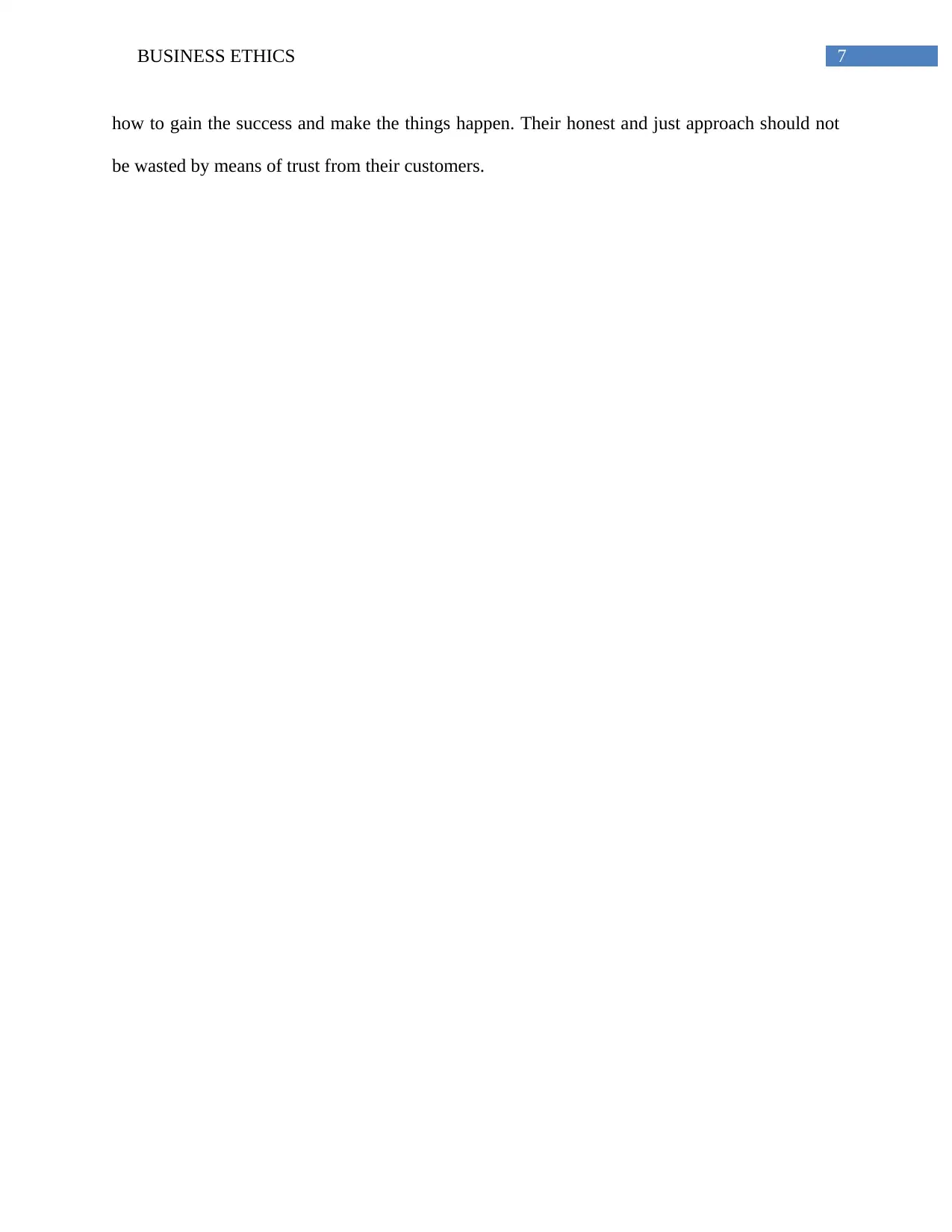
7BUSINESS ETHICS
how to gain the success and make the things happen. Their honest and just approach should not
be wasted by means of trust from their customers.
how to gain the success and make the things happen. Their honest and just approach should not
be wasted by means of trust from their customers.
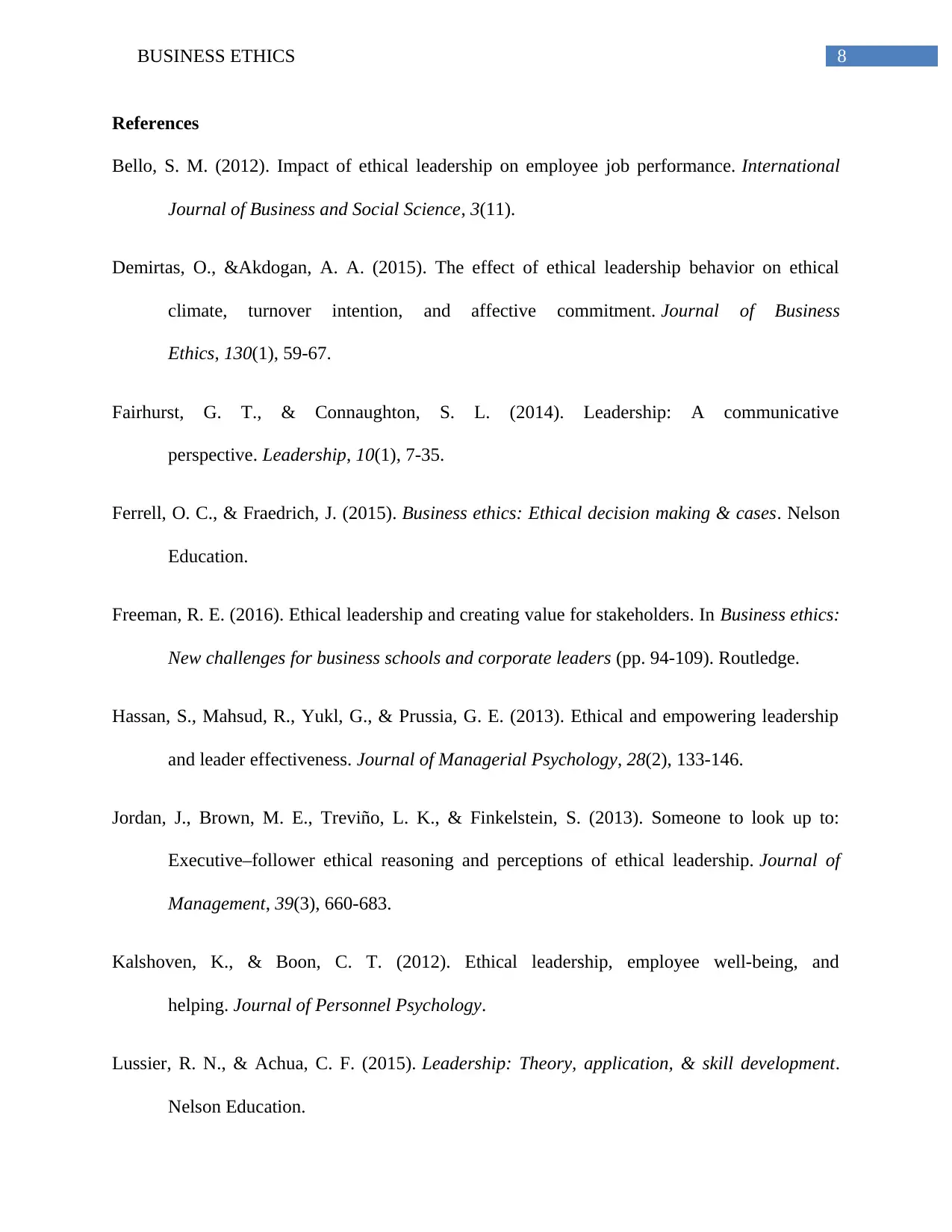
8BUSINESS ETHICS
References
Bello, S. M. (2012). Impact of ethical leadership on employee job performance. International
Journal of Business and Social Science, 3(11).
Demirtas, O., &Akdogan, A. A. (2015). The effect of ethical leadership behavior on ethical
climate, turnover intention, and affective commitment. Journal of Business
Ethics, 130(1), 59-67.
Fairhurst, G. T., & Connaughton, S. L. (2014). Leadership: A communicative
perspective. Leadership, 10(1), 7-35.
Ferrell, O. C., & Fraedrich, J. (2015). Business ethics: Ethical decision making & cases. Nelson
Education.
Freeman, R. E. (2016). Ethical leadership and creating value for stakeholders. In Business ethics:
New challenges for business schools and corporate leaders (pp. 94-109). Routledge.
Hassan, S., Mahsud, R., Yukl, G., & Prussia, G. E. (2013). Ethical and empowering leadership
and leader effectiveness. Journal of Managerial Psychology, 28(2), 133-146.
Jordan, J., Brown, M. E., Treviño, L. K., & Finkelstein, S. (2013). Someone to look up to:
Executive–follower ethical reasoning and perceptions of ethical leadership. Journal of
Management, 39(3), 660-683.
Kalshoven, K., & Boon, C. T. (2012). Ethical leadership, employee well-being, and
helping. Journal of Personnel Psychology.
Lussier, R. N., & Achua, C. F. (2015). Leadership: Theory, application, & skill development.
Nelson Education.
References
Bello, S. M. (2012). Impact of ethical leadership on employee job performance. International
Journal of Business and Social Science, 3(11).
Demirtas, O., &Akdogan, A. A. (2015). The effect of ethical leadership behavior on ethical
climate, turnover intention, and affective commitment. Journal of Business
Ethics, 130(1), 59-67.
Fairhurst, G. T., & Connaughton, S. L. (2014). Leadership: A communicative
perspective. Leadership, 10(1), 7-35.
Ferrell, O. C., & Fraedrich, J. (2015). Business ethics: Ethical decision making & cases. Nelson
Education.
Freeman, R. E. (2016). Ethical leadership and creating value for stakeholders. In Business ethics:
New challenges for business schools and corporate leaders (pp. 94-109). Routledge.
Hassan, S., Mahsud, R., Yukl, G., & Prussia, G. E. (2013). Ethical and empowering leadership
and leader effectiveness. Journal of Managerial Psychology, 28(2), 133-146.
Jordan, J., Brown, M. E., Treviño, L. K., & Finkelstein, S. (2013). Someone to look up to:
Executive–follower ethical reasoning and perceptions of ethical leadership. Journal of
Management, 39(3), 660-683.
Kalshoven, K., & Boon, C. T. (2012). Ethical leadership, employee well-being, and
helping. Journal of Personnel Psychology.
Lussier, R. N., & Achua, C. F. (2015). Leadership: Theory, application, & skill development.
Nelson Education.
⊘ This is a preview!⊘
Do you want full access?
Subscribe today to unlock all pages.

Trusted by 1+ million students worldwide
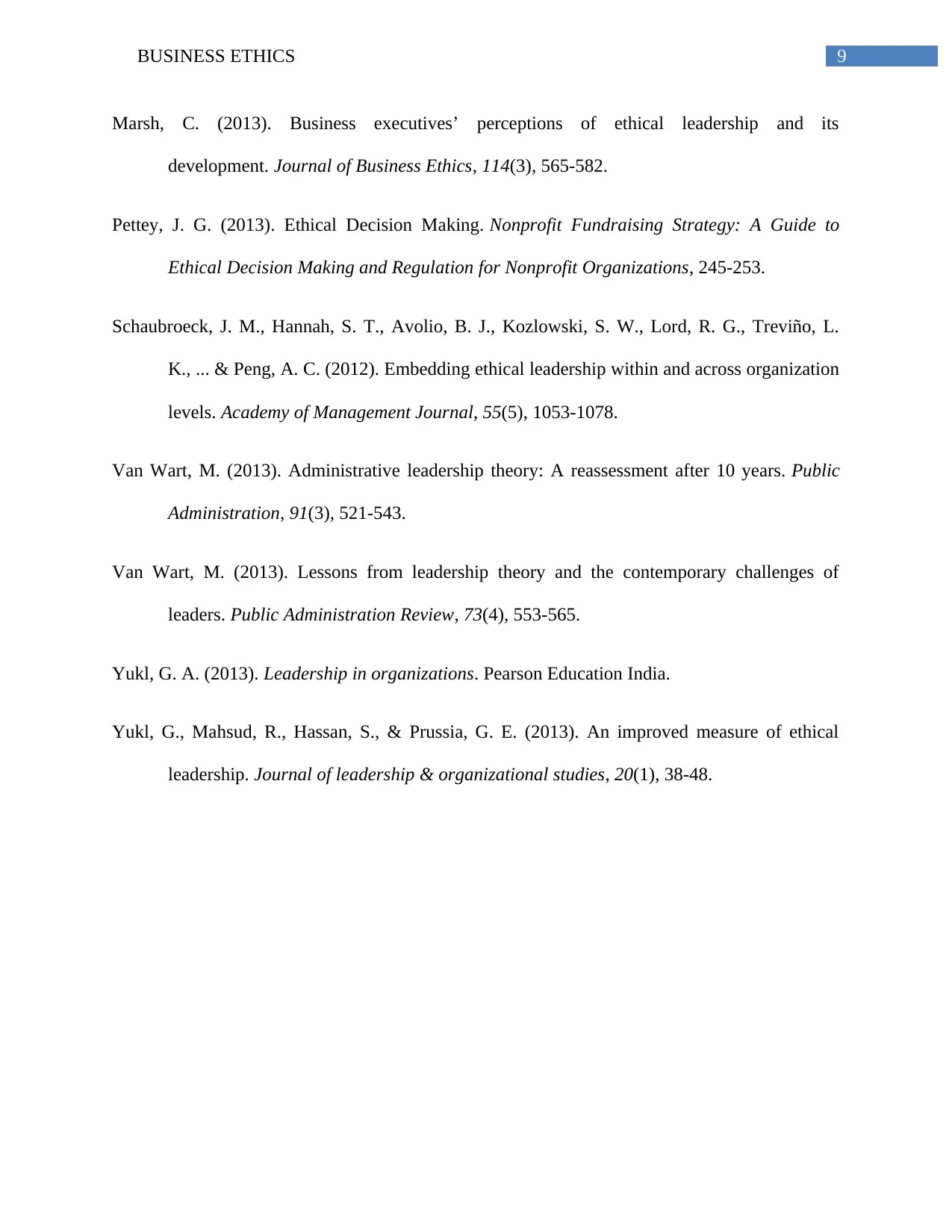
9BUSINESS ETHICS
Marsh, C. (2013). Business executives’ perceptions of ethical leadership and its
development. Journal of Business Ethics, 114(3), 565-582.
Pettey, J. G. (2013). Ethical Decision Making. Nonprofit Fundraising Strategy: A Guide to
Ethical Decision Making and Regulation for Nonprofit Organizations, 245-253.
Schaubroeck, J. M., Hannah, S. T., Avolio, B. J., Kozlowski, S. W., Lord, R. G., Treviño, L.
K., ... & Peng, A. C. (2012). Embedding ethical leadership within and across organization
levels. Academy of Management Journal, 55(5), 1053-1078.
Van Wart, M. (2013). Administrative leadership theory: A reassessment after 10 years. Public
Administration, 91(3), 521-543.
Van Wart, M. (2013). Lessons from leadership theory and the contemporary challenges of
leaders. Public Administration Review, 73(4), 553-565.
Yukl, G. A. (2013). Leadership in organizations. Pearson Education India.
Yukl, G., Mahsud, R., Hassan, S., & Prussia, G. E. (2013). An improved measure of ethical
leadership. Journal of leadership & organizational studies, 20(1), 38-48.
Marsh, C. (2013). Business executives’ perceptions of ethical leadership and its
development. Journal of Business Ethics, 114(3), 565-582.
Pettey, J. G. (2013). Ethical Decision Making. Nonprofit Fundraising Strategy: A Guide to
Ethical Decision Making and Regulation for Nonprofit Organizations, 245-253.
Schaubroeck, J. M., Hannah, S. T., Avolio, B. J., Kozlowski, S. W., Lord, R. G., Treviño, L.
K., ... & Peng, A. C. (2012). Embedding ethical leadership within and across organization
levels. Academy of Management Journal, 55(5), 1053-1078.
Van Wart, M. (2013). Administrative leadership theory: A reassessment after 10 years. Public
Administration, 91(3), 521-543.
Van Wart, M. (2013). Lessons from leadership theory and the contemporary challenges of
leaders. Public Administration Review, 73(4), 553-565.
Yukl, G. A. (2013). Leadership in organizations. Pearson Education India.
Yukl, G., Mahsud, R., Hassan, S., & Prussia, G. E. (2013). An improved measure of ethical
leadership. Journal of leadership & organizational studies, 20(1), 38-48.
1 out of 10
Related Documents
Your All-in-One AI-Powered Toolkit for Academic Success.
+13062052269
info@desklib.com
Available 24*7 on WhatsApp / Email
![[object Object]](/_next/static/media/star-bottom.7253800d.svg)
Unlock your academic potential
Copyright © 2020–2025 A2Z Services. All Rights Reserved. Developed and managed by ZUCOL.





